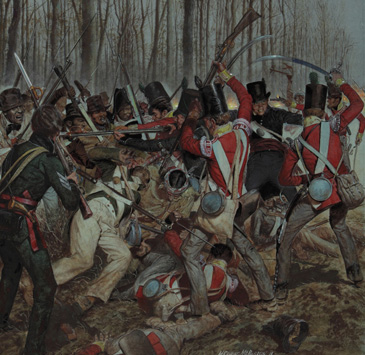In June 1807, the United States and Great Britain appeared on the verge of conflict: After the frigate Leopard fired on the US warship Chesapeake, British sailors boarded the American vessel, mustered the crew, and impressed four black seamen—Jenkins Ratford, William Ware, Daniel Martin, and John Strachan—whom they claimed were deserters. The damaged Chesapeake limped back to Norfolk with three dead and 18 wounded.
Following the federal militia act of 1792, most states required free white male citizens to serve but took no position on African Americans.

Army Art Collection, U.S. Army Center of Military History
The Chesapeake-Leopard affair represented one of the most demeaning episodes in the early history of the United States. Associated with events that caused the second Anglo-American war, this affair involved the act of boarding a neutral ship and forcing sailors to serve aboard British warships, both thorny diplomatic issues that divided the two countries well into the 1800s. Even more significant, three of the four impressed sailors—Martin, Strachan, and Ware—were black men, and all claimed to be Americans who had been impressed. During the debates and protests that followed, race did not figure into the national dialogue. Nonetheless, it remained central in this episode and in the history of the War of 1812.
As during the American Revolution, black sailors and soldiers saw the second war with Britain as a means to advance their own agenda. For free blacks, the War of 1812 provided the chance to broker their participation in ways that enhanced their individual and collective status within society. Yet for free blacks, the war did not advance their march toward equality but rather initiated a new era of prejudice and racial discrimination. For enslaved peoples, serving as participants could provide an avenue to freedom, but it did not happen as often as expected.
After the Revolutionary War, the US government had chosen to limit the size of the American army, and this ultimately created opportunities for free blacks and slaves. The traditional fears of a large standing army, as well as burdening fiscal concerns, carried great considerations and prompted Americans to rely upon citizen soldiers. The 1792 federal militia act further defined the role of American citizens in defending their country by placing responsibility for arming the militia on the individual and making states responsible for training and enforcement of the federal and state statutes. Each state did have the authority to clarify the federal mandate, even though most simply mimicked the wording of the 1792 act. New Jersey (1792), Vermont (1797), North Carolina (1806), and New Hampshire (1808) required free white male citizens to serve but took no position on African Americans. Some states such as North Carolina and Virginia permitted blacks to muster alongside whites. Others such as Connecticut (1784), Massachusetts (1785), and South Carolina (1800) exempted blacks from the militia altogether; South Carolina even forbade “negroes” to be “armed with any offensive weapons unless in cases of alarm.”
The action of the states did not create any significant problems for the country, as there was no serious “alarms” or crises necessitating troops. But by the early 1800s, America’s difficulties with Britain and with various American Indian tribes on the northwestern frontier, forced a re-evaluation of the federal mandate.
Last updated: August 15, 2017
